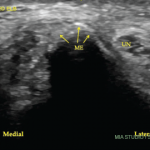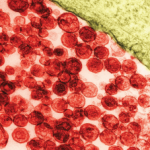Dr. Simon Helfgott’s essay, “Barking at the Moon,” in the July 2015 issue of The Rheumatologist, about the unintended consequences of EHRs (electronic health records) prompted me to share my experience regarding the newly recognized KeMo disease.
Keyboarding and mouse-clicking (KeMo) activity now consumes about 50% of the medical clinician’s day, as the modern EHRs are installed and the Medicare Meaningful Use and ICD-10 coding regulations are enforced. As Dr. Helfgott notes, dogs can learn to fetch sticks much quicker than doctors can learn the new documentation and coding procedures demanded by Medicare.
KeMo has diffuse, adverse effects on the human musculoskeletal system. (Dogs have not yet learned to efficiently keyboard, to my knowledge.) My physician colleagues are suffering from a variety of overuse syndromes such as carpal tunnel syndrome; thumb osteoarthritis and tendinitis; and lateral elbow epicondylitis. They can be spotted in the hallways with their wrist splints, elbow braces and neck collars. Four hours of sitting and keyboarding daily are likely to create an epidemic of low back pain, swollen feet and metabolic syndrome. Clearly, additional research will be needed to see what corrective measures can be taken, until doctors are replaced by robots.
Health system CEOs tell us that KeMo is necessary to cure the malignant cost and quality problems that are afflicting modern medicine. KeMo will make you feel poorly, and you will experience some suffering in the short term. However, over time KeMo will cure all of your problems, and you will feel wonderful.
Sincerely,
John F. Beary, MD
Clinical Professor of Medicine/Rheumatology
University of Cincinnati School of Medicine
Cincinnati


